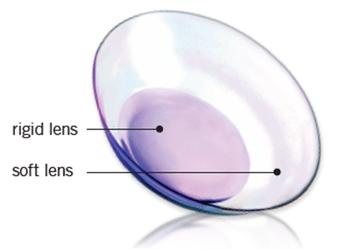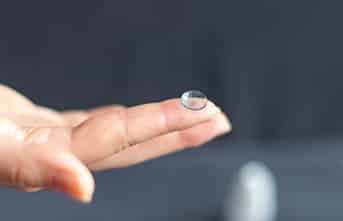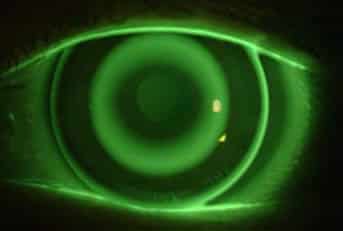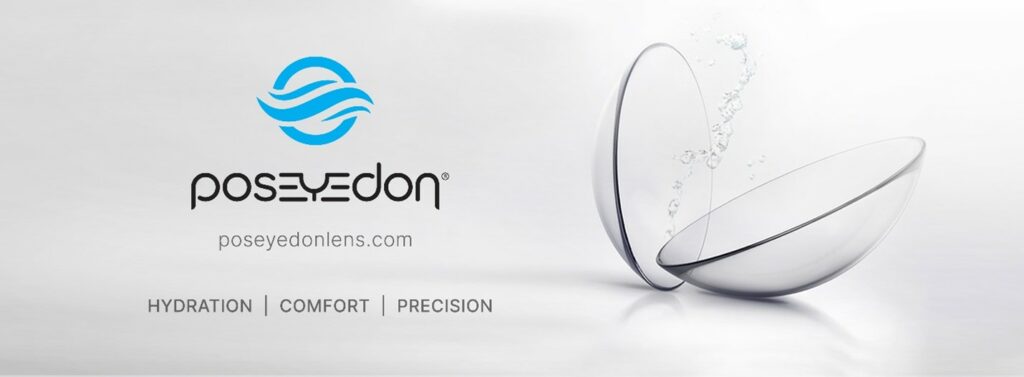
Types of Contact Lenses
Soft Lenses
Soft contact lenses are the most common type of lens worn and can provide exceptional comfort when fit properly. Soft lenses are worn during the day and should be removed before bed. Lenses can be replaced daily, every two weeks, monthly, or quarterly, depending on the material. Many different types of commercial and custom soft lens options are available, and we will ensure you find a lens that fits the shape of your eye the best.
Rigid Gas-Permeable (RGP) Lenses
These lenses provide sharp optics and allow for optimal corneal health. The rigid lens retains its shape while on the eye, as opposed to soft lenses that conform to the eye, minimizing the effects that corneal abnormalities can have on a patient’s vision. The gas permeable material allows oxygen to be properly transmitted to the cornea, improving corneal health. These lenses are durable and resistant to debris accumulation, making easy handling and care an attractive feature.
Popular Soft Lens Designs:
Daily Disposable Lenses
Disposable contact lenses are designed to be worn once and thrown away. This frequent replacement modality is the healthiest option for your eyes and allows you to experience the exceptional comfort of a fresh lens every day.
Toric Lenses (For Astigmatism Correction)
Toric contact lenses are designed to correct for astigmatism in your prescription and will quickly settle on your eye in the proper orientation. Numerous toric options are available to correct for your astigmatism.

Concerned about waste buildup from tossing your contact lenses every day? We participate in a contact lens recycling program called the Bausch + Lomb ONE by ONE Recycling Program. Collect your contact lenses and blister packs and drop them off at our receptacle in office. Your used materials will then get recycled into raw formats used to be made into new products! More information on this program can be found here: www.terracycle.com/en-US/brigades/bauschrecycles

Multifocal Lenses (For Reduced Dependence on Readers)
Multifocal contact lenses contain multiple prescriptions all in one lens. Similar to progressive or bifocal glasses, multifocal lenses allow the viewer multiple clear fields of vision, at near, intermediate, and far distances. Gain independence from readers with this all-in-one lens!
Rigid Gas-Permeable (RGP) Lens Designs:
Scleral Contact Lenses
Scleral lenses are large gas permeable contact lenses that are custom-designed and precision-cut for each individual patient. These medical devices require proper evaluation and are prescribed by a licensed and skilled eye care practitioner. A cushion of sterile saline held between the cornea and the contact lens allows for maximum comfort and exceptional vision, even for patients with irregular corneas.
High-Definition Scleral Contact Lenses

Country Hills Eye Center is proud to offer the XWave Higher Order Aberration correction system, powered by OVITZ, the latest in visual improvement technology.
Every individual has some kind of inconsistency, or ‘aberration’ with the shape of our eyes. Common aberrations such as nearsightedness and astigmatism are easily diagnosed, and corrected, with glasses, contact lenses, or laser eye surgery. Some people have more complex aberrations known as Higher Order Aberrations, or HOAs. People with HOAs can experience greater difficulty with their vision. Common symptoms include glare, halos, starbursts, double vision, and troubles with night vision. HOAs can manifest from various ocular diseases such as keratoconus, trauma, or post-operative issues from surgeries like LASIK and RK. Historically, eyes with HOAs have been very difficult to measure and correct.
With the OVITZ XWave system we are now able to identify and correct HOAs through the use of scleral lenses. Follow the link below to learn more about this exciting new technology. https://www.ovitz.us/
PosEYEdon Contact Lenses
PosEYEdon lenses are a scleral lens design customized for the active wearer desiring a longer wearing time, sharper vision, greater comfort, and an overall improved quality of life. Designed specifically for you and your visual needs, these lenses offer stable vision and relief from symptoms of contact lens dryness.
Hybrid Contact Lenses
Hybrid lenses combine rigid gas permeable and soft lens materials. The center of the lens is an RGP, providing optimal oxygen transmission and visual clarity, with a soft periphery of the lens to maximize comfort.

Corneal RGP Lenses
Corneal RGP lenses are small gas permeable contact lenses that rest entirely on the cornea. The rigid nature and small profile means that these lenses provide sharp optics and are easy to insert. Due to their smaller design, theses lenses do require an adaptation period of a few weeks to months to become comfortable.

Orthokeratology Contact Lenses
Ortho-K, or orthokeratology lenses, are custom contact lenses that are designed to be worn overnight only. These lenses gently reshape the front surface, similar to an overnight retainer prescribed by an orthodontist. The lenses are removed in the morning, allowing the patient to see clearly during the day without the need for glasses or contact lenses.

Caring for Your Contact Lenses
To help maintain the health of your eyes and vision, it is important that you carefully follow the instructions to properly care for your contact lenses.
- Before handling your contact lenses, always wash your hands with soap and dry them with a lint-free towel.
- Use contact solution to cleanse your contacts before inserting them into your eyes.
- Never use tap water or old solution to clean your contacts.
- Always insert contacts prior to applying any cosmetics, but use hairspray before you insert your contacts.
- After inserting your contacts into your eyes, empty your contact case and rinse it thoroughly using fresh contact cleansing solution. Leave the empty case open to air dry.
- Never wear your contacts overnight, as it may lead to an eye infection.
- Replace your contact lenses case regularly; at least every three to six months.
If you experience any symptoms of infection, such as eye pain, blurry vision, swelling, discharge, or sensitivity to light, remove your contacts and schedule an appointment with one of our eye physicians as soon as possible.


